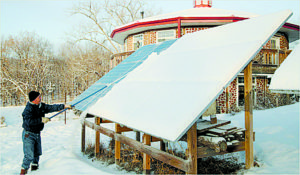
Keep your panels clear of snow for maximum efficiency in the winter. Photo credit: solarworld4u.com
By Green Energy Times staff
You may be reading this article because you are very interested in solar technology but just are not sure the upfront investment is worth it if you wish to own your solar energy system. There are many benefits of generating electricity from the sun including financial energy independence and environmental stewardship, but what about the financials? Below are a few points to consider in your financial quest.
- Solar does work in the winter. The panels are more effective when they are cooler which allows for a great energy transfer from the sunlight to the panels. Cold and bright conditions are ideal. The downside of the winter season is the sun is lower in the sky and there are fewer daylight hours. Therefore, less energy will reach the panels over time. If you are on the grid, you can have credits built up from the summer production that covers for the fewer hours of production in the winter which can negate your utility charges. Energy efficiency can really add to the success of accomplishing your energy goals.
- Solar builds equity over time. A solar array may cost from $15,000 – 30,000. Many would not think twice about such an investment for a vehicle that just depreciates over time. Your solar investment builds equity as time goes on. While many panels have a twenty-five year performance warranty, no one really knows why they will not keep working longer and possibly for your lifetime or longer, as long as the sun keeps shining.
- Great incentives are available. If you own your system, there are federal and state rebates available. The current Federal tax credit at 30% of the solar array including parts and labor. State rebates vary and can be found in the incentive section of Green Energy Times (pages 16 and 17).
- You can make money while on vacation. If the sun is shining and you are not at home using electricity (other than the amount to run the refrigerator and other necessary appliances), you are gaining credit if you are net-metering and also producing kW which can earn you renewable energy credits (SREC’s) for those living in a state which offers them (MA, NH). More information on SREC’s can be found in the article on page 14 of this issue.
- Energy independence. You are immune to rate hikes which only make your payback period calculations decrease for your solar project.
- Property value can increase. Solar energy may increase the value of your home and make it more attractive to buyers. According to the Homebuilder’s Guide to Going Solar, solar-powered homes sell twice as fast as homes equipped with conventional electricity. A report by the National Bureau of Economic Research suggests that (especially in more liberal states) homeowners can recover up to 97% of their initial solar investment costs with selling a home with a solar array.
- Lower vehicle operating cost. If you make excess power, it can be used to charge electric vehicles for free.
The cost of going solar has dropped every year since 2009. Not only are the prices of panels dropping, so are the costs associated with installation.
The amount of money you can save with solar depends upon many things such as your electrical consumption which determines the size of the array you need, if you choose to buy or lease your system, and how efficient the panels are given the direction the panels face and how much sunlight hits them. Your savings also depend on the electricity rates set by your utility and how much the utility will compensate you for the excess solar energy you send back to the grid.
There are many variables to consider when figuring out the financial impact of a solar installation. However, one thing is certain, solar will keep our planet green and will keep more green in your wallet, too!








Leave a Reply